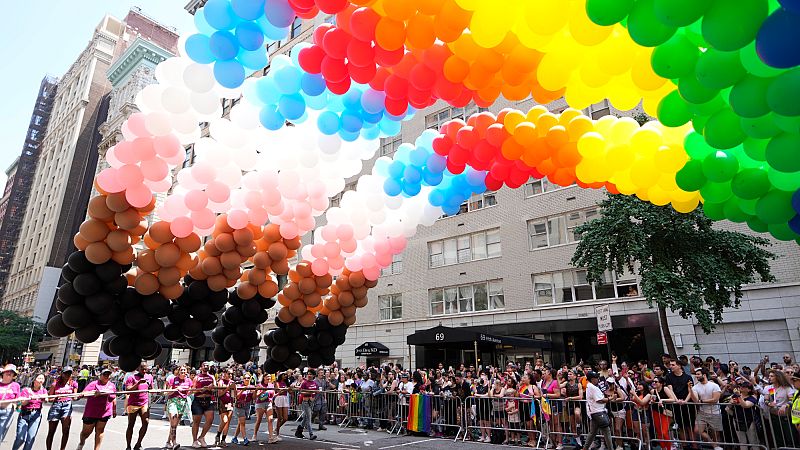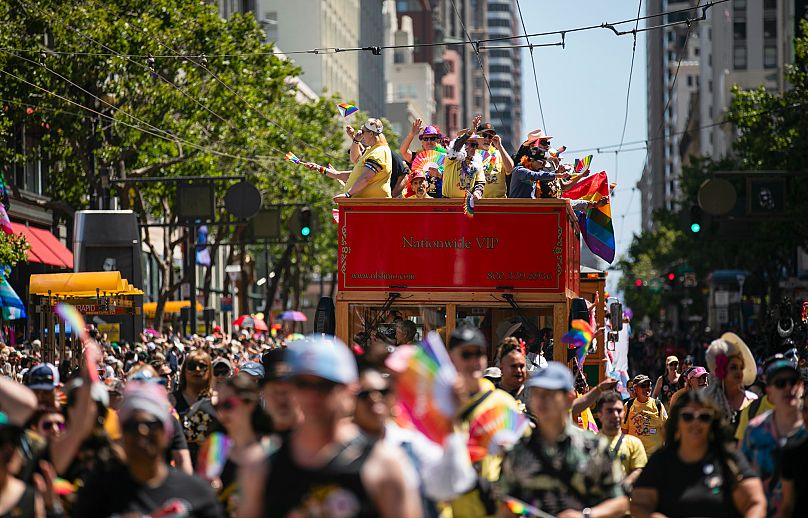
In the United States, every June is Pride month – commemorating the contributions of lesbian, gay, bisexual, transgender and queer culture and community.
This period allows for a wide range of events, parades, marches, and discussions to take place, providing opportunities for LGBTQ individuals and their allies to come together and make their voices heard.
This year, expect fewer rainbow logos and less corporate celebration.
Despite a long track record of supporting the LGBTQ community, many companies said they would no longer participate in “external events” such as Pride parades and are pulling their sponsorships.
This is a major pivot for the once proud corporate America who until now considered DEI efforts as essential for business success.
It comes as Donald Trump’s administration cracks down on DEI (diversity, equity and inclusion) programmes, transgender rights emerge as a culture-war flashpoint and Trump’s tariff policy has ushered in a period of considerable economic uncertainty for companies and consumers.
Around two in five corporations have scaled back their financial contributions to Pride month, according to Gravity Research, which advises companies on social, political and reputational risks.
Examples? Mastercard isn’t renewing its sponsorship of NYC Pride but said it would still participate in the event. Other traditional New York sponsors like soda and snacks maker PepsiCo and car manufacturer Nissan are not returning this year.
Banking giant Citi is not returning to sponsor NYC Pride, but plans to march there as well as in at least 30 pride events globally.
Other Pride events have also lost key sponsors including brewing and spirits groups Anheuser-Bush in St. Louis and Diageo in San Francisco.

The loss of big-name sponsors has forced Pride organisers to find alternative funding to ensure the parades take place without a hitch.
Despite corporate intentions to keep a low profile without angering customers, the Pride community is not discouraged.
“This is concerning for the LGBTQI+ community in the short term, but some companies are even doubling down on their sponsorship and support. So, I don’t think this will be a long-term phenomenon,” Caleb Smith, director of LGBTQI+ Policy at the Center of American Progress, a liberal Washington-based think tank, told Euronews.
“We need to see how many of these temporary pullbacks are here to stay. I think that, in reality, the consequences will be rather limited,” she added.
57% of federal contractors plan to dial back “external engagement” because they do not want to be caught in a publicity battle with the government, according to Gravity Research.
For example, defense contractor Booz Allen Hamilton, which shuttered its DEI department, dropped sponsorship of Washington’s WorldPride 2025.
The star-studded festival in the American capital is one of the biggest Pride events in the country. Organizers are expecting the more than 2 million visitors to spend almost $800 million, making it a lucrative showcase for corporate sponsors.
WorldPride says the annual purchasing power of the LGBTQ community in the United States is about $1.4 trillion, and it claims global buying power three times that much. And the typical LGBTQ household’s disposable income is nearly double the national average.
No wonder that what some call “rainbow capitalism” will continue to attract dozens of blue-chip sponsors and partners to Washington’s Pride event, ranging from Amazon and Hilton to Verizon and McDonald’s.
“Hopefully, we can still educate consumers” on which companies to support and which not, Caleb Smith said.
A recent survey suggests that Americans broadly support the Pride marches.
A GLAAD-Ipsos poll found 70% of Americans say that knowing a company offers LGBTQ Pride merchandise either positively affects or does not impact their purchasing decisions negatively.
Slightly more – 71% – believed companies should be free to support Pride month if they choose.







